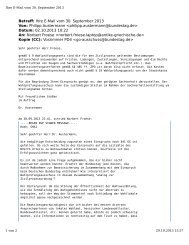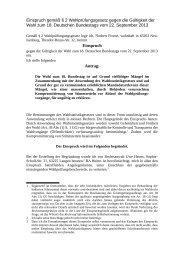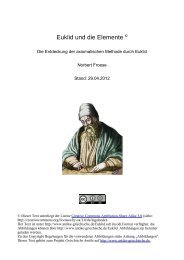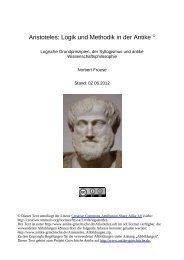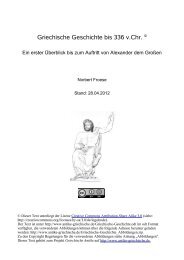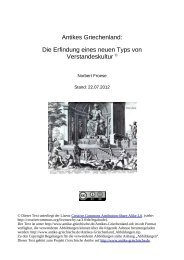Antike Philosophie: Platon - Mathematik ... - Griechische Antike
Antike Philosophie: Platon - Mathematik ... - Griechische Antike
Antike Philosophie: Platon - Mathematik ... - Griechische Antike
Sie wollen auch ein ePaper? Erhöhen Sie die Reichweite Ihrer Titel.
YUMPU macht aus Druck-PDFs automatisch weboptimierte ePaper, die Google liebt.
[D] Eine Zensur muß die gesamte intellektuelle Tätigkeit der herrschenden<br />
Klasse kontrollieren, während eine unausgesetzte Propaganda ihre Gedanken<br />
zu prägen und gleichzuschalten hat. Neuerungen in Erziehung und Religion<br />
sind zu verhindern oder gar zu unterdrücken.<br />
[E] Der Staat muß sich selbst versorgen können. Er muß nach ökonomischer<br />
Autonomie streben; sonst wären nämlich seine Herrscher entweder von den<br />
Händlern abhängig, oder sie würden selbst zu Händlern werden. Das eine<br />
würde ihre Macht, das andere ihre Einheit und das innere Gleichgewicht des<br />
Staates untergraben.<br />
Nicht zu Unrecht, glaube ich, kann man ein solches Programm totalitär<br />
nennen. 128<br />
Popper sieht <strong>Platon</strong>s Neigung zu einer totalitären Gerechtigkeit in engem Zusammenhang<br />
mit einem Historizismus, den Popper <strong>Platon</strong> unterstellt. Etwas vergröbert kann man<br />
sagen, dass Popper meint, <strong>Platon</strong> glaube an unabänderliche historische Gesetze. Dieser<br />
Teil von Poppers <strong>Platon</strong> Buch hat mich jedoch weniger überzeugt. Die Historizismus<br />
These, die Popper im Band 2 von Die offene Gesellschaft und ihre Feinde gegenüber<br />
Hegel und Marx in Anschlag bringt, ist ungleich viel besser fundiert.<br />
In diesem Papier wird es um Poppers Vorwurf der totalitären Gerechtigkeit, nicht aber um<br />
seine Historizismus These gehen. Vielleicht ist es für den deutschsprachigen Leser<br />
zunächst einmal ganz nützlich, wenn er erfährt, dass, trotz der auch in anderen Sprachräumen<br />
geübten Kritik an Poppers <strong>Platon</strong> Buch, das Stichwort Totalitarismus in<br />
Zusammenhang mit <strong>Platon</strong> keineswegs überall nur Kopfschütteln und/oder baffes Erstaunen<br />
auslöst. Ich zitierte aus der Internet-Version der Stanford Encyclopedia of Philosophy:<br />
Some of the most heated discussions of the politics of Plato's Republic have<br />
surrounded the charge of totalitarianism famously advanced by Karl Popper (in<br />
The Open Society and its Enemies). Like the other "isms" we have been<br />
considering, totalitarianism applies to the Republic only conditionally,<br />
depending on the definition of ‘totalitarianism’ offered.<br />
First, we might define as totalitarian those regimes in which the political<br />
power is concentrated in one bloc, and the ruled have no alternative. On this<br />
definition, the ideal city of Plato's Republic is surely totalitarian. Socrates<br />
carefully argues that the ruled in his "Kallipolis" (as the ideal city is sometimes<br />
called) endorse the ruling party. When he argues that those without knowledge<br />
will concede that only the philosophers have knowledge (476d-480a), he is in<br />
effect demonstrating his confidence that the non-philosophers in Kallipolis will<br />
recognize the appropriateness of rule by philosophers. And if he is correct that<br />
in ideally ruled circumstances, even the producers who locate their good in the<br />
satisfaction of necessary appetitive attitudes will have optimally satisfied<br />
psychological attitudes, then he is justified in thinking that the ruled will find<br />
Kallipolis to be ideally ruled. So by showing concern for the consent of the<br />
governed, Socrates is painting a totalitarian state nicer than some, but he is<br />
still, by the first definition, painting a totalitarian state.<br />
Second, we might define as totalitarian those regimes that exercise<br />
propagandistic control over the values and interests of the ruled. Again, by this<br />
definition, the ideal city of Plato's Republic will count as totalitarian. There is<br />
no doubt that the censored education in Kallipolis represent totalitarian<br />
concerns, as does Kallipolis' use of a "noble lie" to convince citizens' of their<br />
unequal standing and deep tie to the city (414b-415d). 129<br />
Ich hoffe, der Leser ist jetzt wenigstens bereit, die Möglichkeit, dass <strong>Platon</strong> in seinen<br />
Dialogen Propaganda für totalitäre Gerechtigkeit betreibt, ernsthaft in Betracht zu ziehen.<br />
Werfen wir einen kurzen Blick auf <strong>Platon</strong>s staatstheoretische Dialoge. Es gibt drei davon.<br />
128 Karl Popper: Die offene Gesellschaft und ihre Feinde Bd 1. München: Francke Verlag 1980. S. 126f<br />
129 Stanford Encyclopedia of Philosophy. Eric Brown: Plato's Ethics and Politics in The Republic<br />
http://plato.stanford.edu/entries/plato-ethics-politics/ (Stand: 22.12.2008)<br />
-71-



